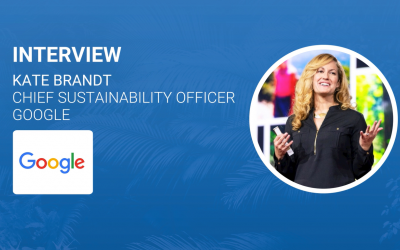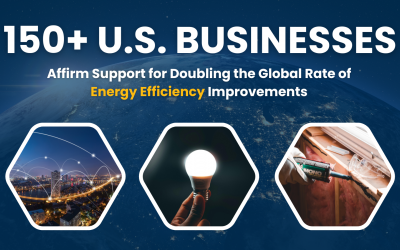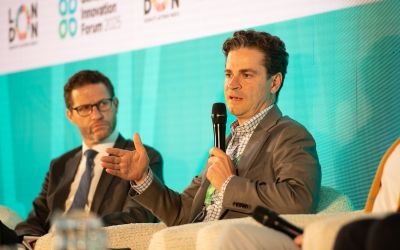Simon King discusses Mitie’s new ‘Plan Zero’ initiative
Climate Action caught up with Simon King, Director of Sustainability, Social Value & Fleet at Mitie, to discuss the company's new 'Plan Zero' initiative.

Climate Action caught up with Simon King, Director of Sustainability, Social Value & Fleet at Mitie, to discuss the company's new 'Plan Zero' initiative.
What should businesses that are looking to transition prioritise?
As an organisation with a national footprint, a large fleet of vehicles and over 77,500 people supporting every industry and every sector throughout the UK, Mitie has been hard at work identifying and delivering opportunities to increase sustainability and reduce carbon in our own operations. We have already committed to reaching net zero carbon a whole 25 years ahead of UK Government targets, and we will reach this milestone by implementing a series of measures that fall under our ‘Plan Zero’ initiative.
Through Plan Zero we are now sharing our expertise in partnership with UK organisations looking to set, certify, and exceed sustainability and CO2 targets.
No two organisations are the same, so it is important to adopt an approach that is sufficiently flexible to address different organizational structures in different sectors, yet rigid enough to ensure key actions and processes are never missed. Mitie achieves this with a simple 5 stage process which addresses carbon across Emissions, Infrastructure and Resources. Our process prioritises the steps to follow to ensure a customer maximises their opportunity to reduce carbon and costs.
Assessment, Baselining & Targeting, Compliance & Certification, Development and Execution.
The process is specifically designed to provide the option to engage at any of its five stages. For example, customers who are aware of the business imperative but are without the skills or resource set realistic, yet ambitious targets and will likely engage at the Assessment stage.
Alternatively, customers who may already have set targets, but are unclear about how best to meet them, may want to engage at the Compliance or Development stage.
Maximum savings and efficiencies are typically gained the earlier the process is initiated from Assessment, right through to Development and Execution.
What are the three things you would advise any customer looking to transition their fleet to do?
Transitioning to EVs is more about infrastructure than just buying new vehicles – it’s creating an integrated energy system, which happens to have cars and vans attached. This brings a broad range of issues, from employee training and charge point installation through to creating new business policies and processes, making a start can be overwhelming.
Fleet selection: As you transition to electric fleet you will need to have a fresh mindset as so the range of brands of vehicles you will select from. Certainly our vehicle options include new and non-traditional fleet manufacturers. The important aspect is to find the vehicles that meet the needs of your workforce, and typically mileage will be the most critical factor to consider. EV still isn’t a scalable solution for large fleet either.
Infrastructure: Access to charge points is one of, if not the, biggest barrier for switching to an EV. We’re often asked by our customers and peers whether they should start with vehicles or charging first. But the fact is, you have to do both in tandem. We’ve installed around 670 charge points across the UK at our employees’ homes, Mitie offices and client sites. We have the capability to design, install and maintain EV charging infrastructure and because we are solution and technology agnostic, we will always develop the most appropriate solution for our customer.
Hearts & Minds: Many people are still unfamiliar with electric vehicles, so we initially found some colleagues were hesitant about switching. During our own transition we worked closely with our EV manufacturer and charge point partners to organise road shows for employees to test drive the vehicles and ask any questions they may have had. This helped secure employee buy-in as our drivers became confident that EVs could meet their needs and highlighted the significant benefits, such as financial savings, to them. Having that employee support for the EV rollout made a big difference – our early adopters definitely helped spread the word about the benefits of electric vehicles.
What are the three key aspects of Mitie’s Plan Zero?
Using Mitie’s skills and expertise - from sustainable consulting to complex design, build & operate renewable project delivery – Plan Zero is bringing our customers on our journey and our Zero Carbon for Zero Cost model provides affordable finance solutions that can be off balance sheet where require.
- Our team of Sustainability Consultants work with our customers to understand and evaluate their current carbon data and status. Plan Zero Sustainability Consultants use this data to create comprehensive, strategies and targets to reduce carbon, ranging from connectivity and optimisation of assets, to renewable heating to biodiversity solutions. Using our design specialists to develop costed and funded solutions, our Sustainability Consultants support our customers throughout their entire Plan Zero journey.
- Our capability in Green Projects & EV is award winning. Last year we saved our customers of 300,000 tonnes of carbon and much of this was via major capital works. Our expertise spans electrical and control systems, including lighting & BMS, mechanical assets such as chillers, renewable heating and cooling, renewable power and EV charging infrastructure. We design, install and maintain our solutions, with a technology agnostic approach.
- As we have the in-house capability to deliver an end-to-end service Mitie can support you through every stage of your net-zero challenge. From the outset we will be able to identify the range of decarbonisations projects and schemes available across your property and fleets, to maximise your investment, reinvest savings to fund further projects and where applicable support in accessing funded solutions.
We have saved over £10m through optimisation activities for one customers.
What would you say to businesses who question whether transitioning to net-zero is unaffordable?
It is our ambition to reduce carbon from the economy. We believe that every organisation should have a plan to achieve net-zero carbon and that cost should not prevent organisations from tackling the climate emergency.
The current economic environment has made businesses even more careful about their costs and for many organisations the budgets to upgrade, replace and install new assets to enable significant decarbonisation are limited. However, with the growing pressure on organisations to reduce costs and be sustainable the question isn’t whether they afford to be net-zero, and is instead whether they can afford not to be.
Within a business there will be identifiable savings and benefits to a more sustainable approach. For example fleet managers have a compelling case for switching to electric. When considering whole life costs, particularly when it comes to cars, EVs will generate significant financial savings for the business, through reduced maintenance, taxes and running costs.
However, it’s important that projects aren’t considered in a silo. At Mitie, all of our environmental initiatives, including electric vehicles, sit under our Plan Zero commitments. Delivering your journey to net-zero in an end-to end programme will achieve the greatest carbon benefit, drive down whole-life costs and align with your business net-zero targets. Through taking a holistic approach to the entire net-zero challenge Plan Zero means you can go further, faster and for less
What is Mitie’s call on local and national government to help businesses adopt EVs?
80% of EV charging takes place at home. However around 45% of Mitie employees, which is representative of the general population, do not have access to off-street parking, significantly hindering the ability to switch to an EV.
We know from our employees that have an EV that one of the great benefits is that when charged at home, the vehicle is always fully charged and ready to go each morning. This reduces, and often eliminates, the need to make special stops to recharge. This is in stark contrast to employees without home charging, who regularly have to make these specific charging trips, making the switch to EV less successful. Range anxiety also means many people will only travel to a destination they know they can make a return trip to with only one charge, as they are not confident they will be able to find a charge point and refuel their vehicle for longer journeys. In fact, in a recent survey of our EV drivers, nearly half (48%) told us that issues with public charge points (such as not being available for on-street parking or a lack of rapid chargers) are a concern for them.
The UK needs an increased investment in EV charge points for on-street and communal parking to address these barriers and more consistency across the UK to ensure that those in more urban or deprived areas aren’t left behind in the EV transition – which is what we are currently experiencing with our own EV transition.
We also find that the UK’s inconsistent approach to charge point infrastructure has resulted in a number of different charge point manufacturers without any requirement for consistent payment systems, resulting in the use of a dozen or more mobile phone apps to cover each different charge point provider. This adds a significant barrier for many of our employees and, for some, the requirement to add credit to so many accounts can also create financial challenges.
We believe that the creation of a comprehensive EV fuel card or app which allows the use of any charge point network would prevent these issues, make it easier for EV drivers to make use of the full spectrum of charge points.






